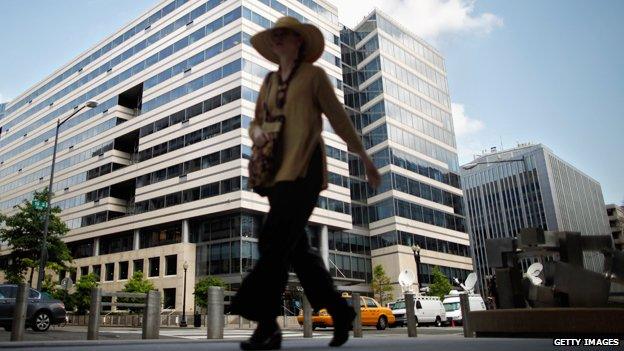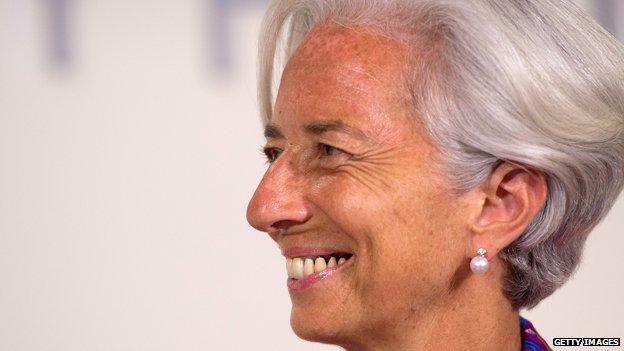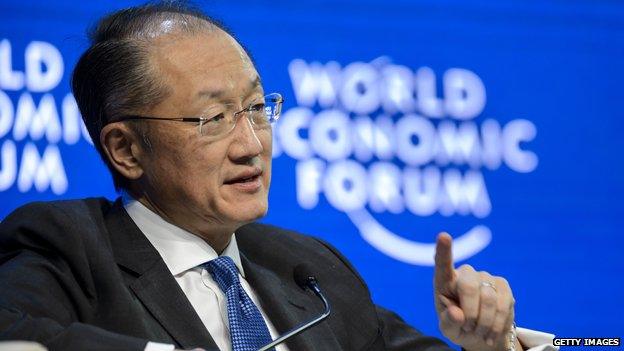Profile: IMF and World Bank
- Published

IMF headquarters in Washington
The International Monetary Fund (IMF) and what is now known as the World Bank, were set up to manage the post-World War II global economy.
They were conceived in 1944 at a conference in Bretton Woods, in the US state of New Hampshire.
By fostering economic cooperation and helping countries with balance of payments problems the founders hoped to avoid a repeat of the 1930s Great Depression.
The IMF aims to preserve economic stability and to tackle - or ideally prevent - financial crises. Over time, its focus has switched to the developing world.
The World Bank's predecessor - the International Bank for Reconstruction and Development - was set up to drive post-war recovery.
Now, it is the world's leading development organisation, working for growth and poverty reduction.
Owned by the governments of its 187 member states, the Bank channels loans and grants and advises low and middle-income countries.
Quota
The IMF is funded by a charge - known as a "quota" - paid by member nations. The quota is based on a country's wealth and it determines voting power within the organisation; those making higher contributions have greater voting rights.
The IMF acts as a lender of last resort, disbursing its foreign exchange reserves for short periods to any member in difficulties.
Since they were conceived, the IMF has been run by a European and the World Bank by a US national.
The IMF and the Bank have served as a rallying point for disparate causes - from environmentalists to anarchists - and meetings have occasionally been accompanied by violent street protests.
Protesters and critics cite the exploitation of the poor and the environment and argue that freer trade threatens the livelihoods of millions of people.
The IMF has admitted that forcing developing countries to open their markets to foreign investors can increase the risk of financial crises.
Its former managing director Horst Koehler said in 2002 that the benefits of globalisation had not been equally shared. But he added that "the objective should not be less globalisation but more and better globalisation."
Quick facts
Conceived: Bretton Woods, New Hampshire, USA
Date: 1944
Headquarters: Washington DC
IMF-World Bank membership: 187 countries
World Bank staff: 10,000
IMF staff: 2,500
Who runs what?
IMF managing director: Christine Lagarde

Christine Lagarde is the first woman to head the IMF in the 65 years of the organisation's history.
She trained as a lawyer and for more than two decades worked for a Chicago-based international law firm, where she specialised in major labour and anti-trust cases.
She served as French trade minister from 2005 to 2007, when she was made finance minister, becoming the first woman to hold such a post in any of the G8 major industrial countries.
Ms Lagarde took over the helm of the IMF in July 2011 at a time when the organisation was facing some extremely tough challenges, with the eurozone in a state of deep crisis and fears looming that countries such as Greece could default on their loans.
Never afraid of speaking her mind, she has blamed the 2008 worldwide financial crisis partly on the male-dominated, testosterone-fuelled culture at global banks.
She is viewed with high regard in the international arena and in 2009 was named best finance minister in Europe by the Financial Times.
She has pledged to improve diversity at the IMF and to push ahead with reforms to give emerging economies more influence in the organisation.
She took over after the previous head, Dominique Strauss-Kahn, who had to resign over charges of sexual assault. He has subsequently been cleared.
World Bank president: Jim Yong Kim

Jim Yong Kim was chosen as the new president of the World Bank in April 2012.
The Korean-American health expert was president of Dartmouth College in the US state of New Hampshire.
He faced a strong challenge for the post, which has traditionally gone to an American, from Nigerian Finance Minister Ngozi Okonjo-Iweala.
Dr Kim succeeded Robert Zoellick is serving a five-year term.
Jim Yong Kim is a doctor lauded for his pioneering role in treating HIV/Aids and reducing the impact of tuberculosis in the developing world.
Crisis response
The IMF and World Bank attempt to help countries or regions in economic turmoil - and often act as a lender of last resort for nation-states.
Past interventions by the IMF have included providing funds for countries caught up in the 1997 Asian financial crisis, and loans to help South American countries such as Argentina and Brazil stave off debt default crises.
In October 2008, the IMF activated an emergency funding scheme for countries facing economic distress resulting from the global financial crisis.
As of August 2010, it had committed around $200bn in lending to a number of economies affected by the crisis. The biggest borrowers then were Hungary, Romania and Ukraine.
The recent eurozone crisis also triggered extensive IMF intervention, including hefty bailouts for countries such as Greece, Portugal and Ireland in tandem with the European Union.
It is currently contributing to the second international bailout of Greece, and discussing further loans to Hungary.
The IMF can also grant emergency loans following natural disasters; these have included the 2004 Asian tsunami.
Representation
Developing countries have voiced dissatisfaction with what they say is their lack of influence in the IMF and World Bank.
This includes the so-called Bric countries - Brazil, Russia, India and China - whose economic power has grown significantly.
They have called for changes to the quota system in which votes in the IMF are weighted in line with member nations' financial contributions.
Under this system, the US has 17% of the vote in the IMF, whereas India, with more than three times the population of the US, has less than one third. And because constitutional changes in the IMF require 85% of the vote, the US has a veto.
The long-standing arrangement under which the IMF is usually led by a European, while the World Bank is led by an American, has also been called into question.
Ms Lagarde quickly appointed Zhu Min - a former deputy governor of the People's Bank of China - to the newly created post of deputy managing director when she took over.